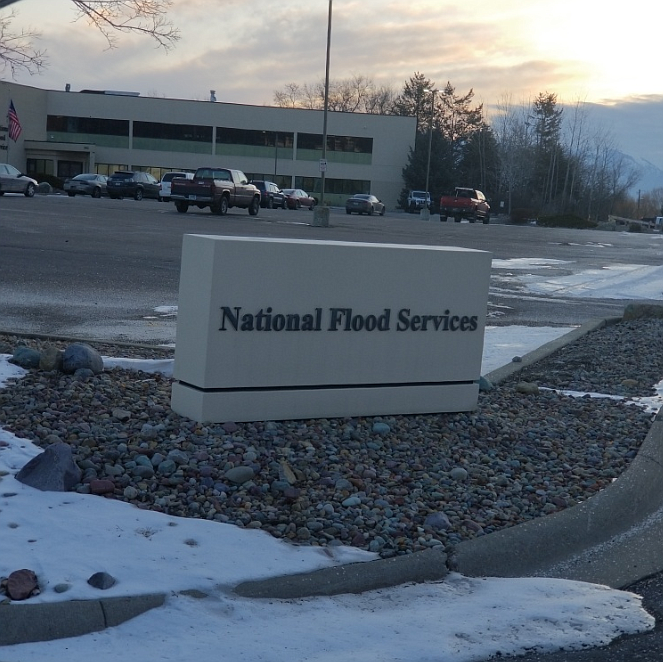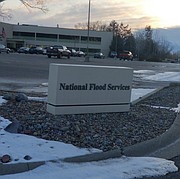Kalispell company hopes to be model for remote work
At National Flood Services, they’re used to dealing with emergency situations, so the Kalispell company is leading the valley’s charge to stop the spread of coronavirus.
The company, which has helped those affected by disasters such as Hurricane Katrina, Hurricane Sandy and Hurricane Harvey, works with clients across the country to deal with the aftermath of natural disasters.
To keep the staff and clients safe from the current threat of COVID-19, the company jumped on the bandwagon early in January to implement new operations aimed at avoiding the virus.
Lindsey Erickson, the senior vice president of operations at National Flood Services, believes their proactive approach can help other area businesses stay safe and return to the status quo as soon as possible.
“For 35 years, National Flood Services has been dealing with large-scale unplanned events…so we’re really built to respond quickly,” Erickson said. “I was born and raised here, so I understand our community and our environment.”
She said the company’s early and intense response to the outbreak was “very different than a lot of businesses in the valley.”
She explained the company made adjustments, “much earlier and much faster than most businesses because our job is to protect people. We understand very intimately what can happen if we are not proactive at mitigating risk.”
In January, before any coronavirus cases were reported in the U.S., National Flood Services started increasing the sanitation in their offices with daily deep cleanings and additional hand-washing stations. In February, they moved to cancel all nonessential travel for the national company.
Then, in early March, they transitioned their 250 local employees into remote work, equipping them with the technology, internet accessibility and guidance necessary to continue their jobs from home. Within two weeks, and before any COVID-19 cases were confirmed in Montana, Erickson said almost 100% of their Kalispell staff had transitioned to working from home.
“We want to be part of the solution,” Erickson explained. So far, she said the changes have gone “pretty seamlessly.”
The company was so eager to make the switch to home-based work, despite the potential difficulties, because Erickson said they believed an infection among their staff would be a bigger threat to business than the challenges from adjusting their operations.
“We need to be available to help others,” she pointed out. “Our workers can’t get sick.”
She also recognized the impact the company could have on the local community by taking these precautions. “We’re such a service-oriented valley,” she observed, and many service workers don’t have the option of doing their work remotely. “We want to take care of our NFS families, which, in turn, helps take care of all the families in our community,” she said.
And she hoped this mindset and their comprehensive strategy could be a model for other area businesses grappling with maintaining business operations throughout a pandemic.
“I think flexibility is the name of the game,” Erickson explained. “I hope other businesses are doing that as well.”
Erickson said she is available to talk to local business leaders about implementing effective strategies to keep workers healthy, and she offered a few general tips from National Flood Service’s extensive experience in dealing with uncertain circumstances.
At National Flood Services, she said they helped set up all of their remote workers with computers, internet service and activities to keep children occupied while their parents are working from home. They have also been conducting a daily virtual meeting with all of their staff members to continually check in on all of their isolated employees.
Plus, Erickson said they have relaxed regulations for paid time off so that employees can go to the grocery store during convenient hours or make lunch for their children.
“You can’t apply blanket corporate policies to situations like this,” she stressed.
She also suggested those switching to remote work should try to hold meetings earlier in the day, “when the home environment is a little more settled and forgiving.” She advised supervisors to schedule staggered or sprint shifts, rather than the traditional straight eight-hour workday, to allow for flexibility with unforeseen circumstances at home.
She added National Flood Services has been well-equipped for this situation because they have prepared with resources like a Business Continuity Plan, which outlines how operations can be restructured when certain employees are out of the office, and a cross-scale matrix, which helps them assess which employees can fill certain roles when coworkers are out sick or on leave.
“It’s all about future planning and mitigating risk,” Erickson emphasized. “That’s what we do every day.”
Erickson is available to help other businesses with these strategies and she can be reached at lindsey.erickson@nationalfloodservices.com
Reporter Bret Anne Serbin may be reached at bserbin@dailyinterlake.com or 758-4459.




